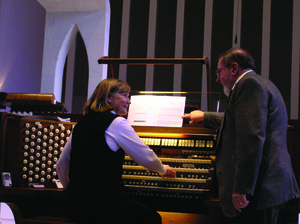

Daniel Gawthrop with Mary Mozelle, helping her understand his intentions.
Dan Gawthrop, who lives in Jonesborough, Tenn., is a prolific composer, perhaps best known for his piece, "Sing Me To Heaven." Hundreds of thousands of copies of the music have been sold, and Gawthrop says he's astonished at the number of people who have been touched by the song. He has a section on his website where people can include their thoughts on the piece.
Gawthrop says his favorite piece is the one he's working on at the moment.
He is working on a commission from the Tennessee Chapters of the American Guild of Organists for a choral anthem to celebrate the 100th anniversary of the state's AGO. It will premiere in 2014. He's also writing a piece for the 100th anniversary of the Westridge School in Pasadena, Calif., and a choral symphony, which will premiere in 2014.
His largest work is an oratorio called "The Passion and the Promise" which was scored for soloists, chorus and full orchestra and is about 100 minutes long. It had premieres in Washington, D.C., Salt Lake City, Utah and Rexburg, Idaho.
Known primarily as a choral composer, his output also includes a substantial body of works for the organ as well as orchestral and instrumental works.
His works have been performed in Europe and in other countries by American choirs on tour.
"As most of my vocal music uses English language texts, performances by foreign choirs are understandably much less common," Gawthrop says. Local church choirs, community choruses and high school and university choirs perform his work fairly often. The Milligan Concert Choir and organists use his music in recital and worship services.
His choral pieces have been performed and recorded by such ensembles as The United States Air Force Singing Sergeants, the Gregg Smith Singers, the Turtle Creek Chorale, the Paul Hill Chorale, the American Boychoir, the Mormon Tabernacle Choir, the Cathedral Choral Society (of Washington National Cathedral) and hundreds of other groups in the U.S. and abroad. He was the composer-in-residence for the Fairfax Symphony Orchestra, Fairfax, Va., for three years.
As a composer he works behind the scenes, but offers those who commission a new piece the opportunity to bring him in for the premiere. While there, he teaches master classes and engages in other activities that support the musical program of the organization. "I believe that people in both performing ensembles and audiences deserve and need to have a personal connection with living, breathing composers," he says.
These commissioned pieces are all different. "As you would probably expect, no two projects are alike in more than superficial ways, and part of the difference is due to the differing kinds of relationships which evolve during the course of a project. Some folks simply give me a date and leave me maximum freedom to follow the muse. Others, often for very practical reasons, give me more detailed instructions about things I will need to avoid or should be sure to include. I try very hard to be responsive to the expressed needs and desires of my performers, because ensuring a good experience for the individual or group is a particular priority. That said, sometimes the piece is the third partner and has its own ideas about how the music should go. I try not to argue with my clients, but I make sure I never argue with my music," Gawthrop says.
He has been a full-time commissioned composer since 1998 and established his own publishing company, Dunstan House, in 1991.
He says the pros of owning your publishing company are "I get to control what pieces are published, which ones stay in print, how they are marketed and what their price will be. The cons are that owning it all means funding it all, risking it all, mastering it all and endlessly worrying about it all. Neither approach seems likely to offer a stable, comfortable income," he says.
Marketing your work is essential in the 21st century, Gawthrop says. "If you wish to make a full-time career out of composition, you simply must have competence in both areas. This is a stiff challenge. Marketing is very much a skill that can be learned. Unfortunately it is such a moving target that the formal schools on the subject are having a difficult time keeping up with the pace of change."
Gawthrop is not sure that the essence of composition can really be taught. "The best we can hope for is that a mentor will be able to offer some suggestions about where to look for that unique inner voice," he says. However, he says his high school choir director, Mary Miller and his first organ instructor Vincent Slater inspired him.
But he thinks that the challenge of inspiring new musicians begins with parents. "If parents do not demand that school systems provide a thorough grounding in the arts, then we will not only have a generation without composers (or poets or painters or whatever), but a generation without skilled listeners. Listening to music is not nearly so passive an activity as most people think, and many of the habits needed to be fully enriched by the arts in our lives can most effectively be acquired early. Primary school and even pre-school is not too young. High school is almost certainly too late to begin."
"I care passionately about using my music to touch hearts, lift listeners and bring joy into people' lives. I hope that is clear in the music I write," he says.
Visit www.dunstanhouse.com for more.